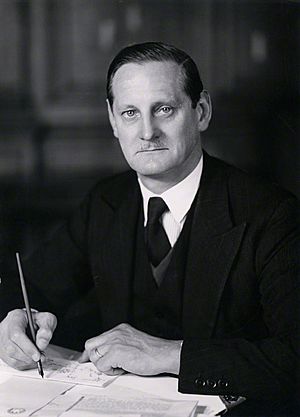Frederick Bellenger facts for kids
Quick facts for kids
Frederick Bellenger
|
|
|---|---|
 |
|
| Secretary of State for War | |
| In office 4 October 1946 – 7 October 1947 |
|
| Monarch | George VI |
| Prime Minister | Clement Attlee |
| Preceded by | Jack Lawson |
| Succeeded by | Manny Shinwell |
| Member of Parliament for Bassetlaw |
|
| In office 14 November 1935 – 11 May 1968 |
|
| Preceded by | Malcolm MacDonald |
| Succeeded by | Joe Ashton |
| Personal details | |
| Born | 23 July 1894 Bethnal Green, London |
| Died | May 11, 1968 (aged 73) Kensington, London |
| Nationality | British |
| Political party | Labour |
Frederick John Bellenger (born July 23, 1894 – died May 11, 1968) was a British politician, soldier, and surveyor. He served as a Member of Parliament (MP) for Bassetlaw for many years. He also held an important role in the government after World War II.
Contents
Early Life and Work
Frederick Bellenger was born in Bethnal Green, London, in 1894. His father, Eugene Bernard Bellenger, was a dairyman. Frederick only went to elementary school. He started working at age 14. He had several jobs, including working in a tea warehouse and as a messenger for the Post Office. He also worked as a clerk for an export company in the City of London.
Serving in World War I
When World War I began in August 1914, Bellenger joined the British Army. He became a gunner in the Royal Field Artillery. He went to the Western Front in 1915. He was wounded twice during the war. He rose through the ranks and became a second lieutenant in 1917. After the war ended in November 1918, he served with the forces in the Rhineland. He left the army in 1919.
While in Cologne, Germany, he met Marion Theresa Stollwerck. She was the daughter of a wealthy German chocolate maker. They got married in 1922 and had five sons and one daughter.
Starting in Politics
After World War I, Bellenger worked as a surveyor and estate agent. He became involved in local politics. He was elected to the Fulham Borough Council in 1922 and 1925. He represented the Baron's Court area. He later joined the Labour Party.
In 1933, he was chosen to run for Parliament in Bassetlaw. This seat was held by Malcolm MacDonald. In the 1935 general election, Bellenger won the seat for the Labour Party. He continued to be the MP for Bassetlaw until he passed away.
World War II Service
When World War II started in 1939, Bellenger was called back to the army. He became a captain in the Royal Artillery in 1940. He went to France as a staff officer with the British Expeditionary Force. He returned to the UK briefly in May 1940. He took part in a debate in Parliament that led to the change of government. He was evacuated from France in June 1940. Two months later, he left the army. Besides his work in Parliament, Bellenger wrote a column for a newspaper called the Sunday Pictorial. His column was titled "Voice of the Services".
Role in Government
After the Labour Party won the 1945 general election by a large amount, Bellenger was given a government job. He became the Financial Secretary to the War Office. In October 1946, he was promoted to Secretary of State for War. This was a very important position. He was also made a Privy Counsellor.
However, some members of his own party were not happy with him. He was removed from his position in October 1947.
Later Years in Parliament
After leaving his government role, Bellenger remained a Member of Parliament. He continued to serve the people of Bassetlaw. Over time, some of his views differed from the main ideas of the Labour Party. For example, he did not agree with the nationalization of the steel industry.
In 1966, the local Labour Party in Bassetlaw decided not to choose him as their candidate for future elections. However, he was still the MP for Bassetlaw when he died in May 1968. He was 73 years old. Just two days before he passed away, he received the honorary freedom of the Borough of Worksop.
 | Kyle Baker |
 | Joseph Yoakum |
 | Laura Wheeler Waring |
 | Henry Ossawa Tanner |

